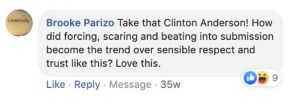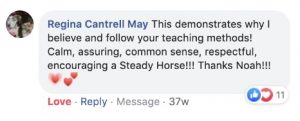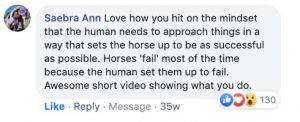Part 4:
Training Your Horse Does NOT Have To Be Dangerous!
Published on July 9th 2022.
by Noah Tillman-Young
HERE’S WHAT WE KNOW
Part 3 (of 6): Why We Need To Train Our Horses Ourselves
- The only way to build a real Unbreakable Bond is to train your horse yourself.
- Having a strong and lasting relationship isn’t about successfully avoiding all problems — it’s about learning to solve those problems TOGETHER.
omewhere along the way, we all became convinced that most people just don’t have what it takes to train a horse.
We became convinced that it had to be a dangerous, theatrical process involving a lot of bucking, fighting and breaking.
And because the rough and tough way is the commonly accepted approach, people believe that it takes a young, athletic person to get the job done.
People started to believe that only a select few with a magic touch could do it safely.
Many trainers were quick to capitalize on this belief, using it to rise to celebrity status. They use showy training to produce horses who will do almost anything — even to the point of injuring themselves in some extreme cases — if the trainer asks it of them.
And the problem with this is that, yes, it IS hard — and dangerous — for the average horse owner to train this way.
Training through inflicting pain and fear on your horse is an inefficient and dangerous way to train.
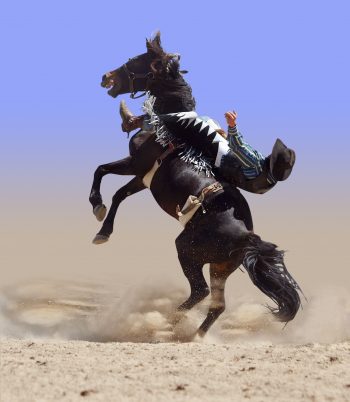
It relies on forcing a horse who doesn’t trust you to do things that scare him. And horses, like most animals, are most dangerous when they are afraid.
We demand respect and obedience, but we offer nothing in return except threats and punishments. And that only makes a horse more fearful.
The thing is, fear-based training is good for the training industry — it keeps people coming back because:
(A) It doesn’t work long-term.
(B) It is too dangerous to attempt on your own.
That’s why so many big-name trainers still promote this approach — even though they KNOW it’s dangerous!
It’s borderline abuse.
This type of intimidation training creates an animal too afraid and cowed to disobey, but it also creates one who will never enjoy their time with you.
If you ask me… that sounds like slavery.
Now, I would hate to know that my horse only did what I asked because they were afraid of me. I don’t want a slave… I want a partner!
I want a bond with my horse.
And that’s the key.
See, while fear and intimidation make for very dangerous training tools… they are not the only way to train.
When you shift your training from fear-based tactics to trust-building exercises, you’ll see how training can actually be completely safe — and even fun — for everyone!
See, lots of trainers talk about being the “alpha.” They talk about how you need to be a leader to your horse… They want you to demand respect. But they’re missing something crucial about what it means to be a leader.
Being a leader isn’t about intimidation. It’s not about force. Of course, some people will warp it into that (and we call those people dictators), but being a good leader… That’s not about scaring someone into obeying you. It’s about protecting the trust of those you lead.
To be our horse’s leader, we don’t need to yell, muscle, and dominate. And we definitely don’t need to resort to the violent techniques some trainers use…
Instead, we need to build our horse’s trust in us and make sure we protect that trust — not abuse it.
I call this the Leading with Love Approach™.
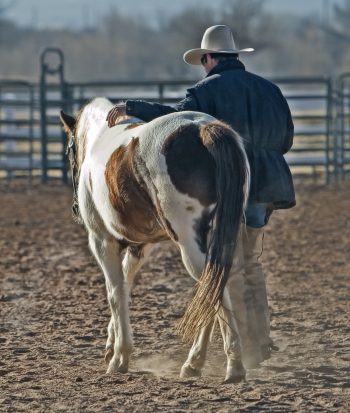
If we do that, our horses know that we won’t ask them to do something that will hurt them. They’ll know they can trust us to keep them safe. And when a horse knows that… you’ll be amazed by how quickly those behavioral problems start to disappear.
Fear-based training creates horses that are unpredictable and insecure. They’ll look for any opportunity to get away from you — to get out from under the pressure you have to constantly apply to control them
Love-based training creates bonded relationships, resulting in horses who are happy to spend time with you and eager to do whatever you ask them to do.
I want to share a video that I think really illustrates what I’m talking about.
When I first posted that video, it went viral. It got around a quarter of a million views, 8,500 comments, and over 2,500 shares!
Seebra Ann said, “I LOVE how you hit on the mindset that the human needs to approach things in a way that sets the horse up to be as successful as possible!”
Regina May said, “This demonstrates exactly why I follow your teaching methods! Calm, assuring, common sense, respectful, and encouraging! Thanks Noah!”
Brook Parizo said, “How did forcing, scaring, and beating into submission become the trend over sensible respect and trust like this? Love this!”
And Teresa Leonard said, “I tried this tonight and it WORKED! Thank you!”
The thing I kept seeing, comment after comment, was that the approach I use really resonates with people!
So you see, with fear-based training, training your horse yourself would be very dangerous. Trying to force your horse to see you as the “alpha…” Using force to demand respect… “Showing them who’s boss…” Of course that’s dangerous!
That doesn’t sound like training… It sounds like warfare!
Who wants to go to war against their horse?
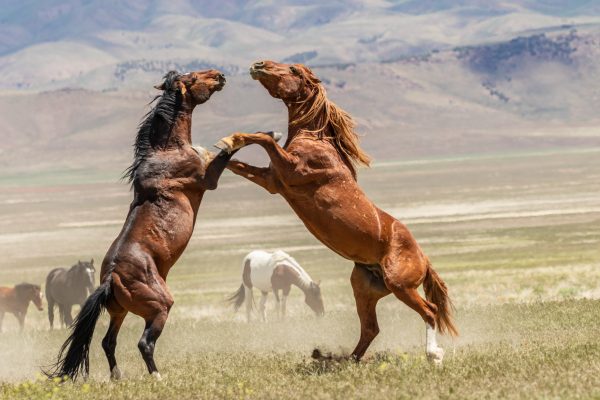
From the very beginning, you’ve been set up to fail at training your horse by yourself.
These lies have been perpetuated by those few who would rather make their money intimidating horses than finding a better way — a way that actually WORKS. Because, if it works, you won’t need them anymore!
But here’s the deal. When you train your horse from a spirit of service… When you treat them with kindness and respect and give them reasons to trust you… Leading with LOVE… You end up with completely different results.
Injuries and accidents should NOT be a necessary part of training. Not if you’re training with trust and love instead of force and fear.
It always makes me think of one of my favorite Bible verses (in fact, much of the Steady Horse approach is based on this verse!):
“There is no fear in love, but perfect love casts out fear. For fear has to do with punishment, and whoever fears has not been perfected in love.”
1 John 4:18
If your horse only obeys you out of fear, they can’t love you.
They only fear punishment, and if they think they can get away with it, they’ll do what they want over what you want every time.
It’s only through building a trusting relationship — a loving bond — that you can trust that your horse will have your back EVERY time.
They’ll do what you ask, not out of fear of punishment, but because they want to please you — because they love you.
And here’s the best part — You’ll find that not only is training your horse yourself SAFER when you train this way…
But it also takes way less time.
On the next page I’ll show you how you can train your horse in just a fraction of the time you thought possible.

